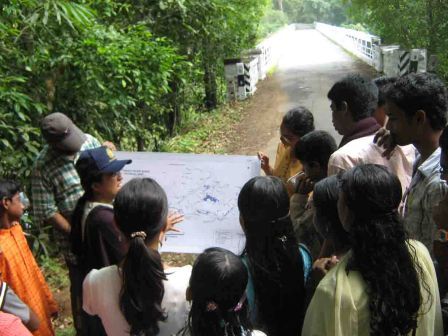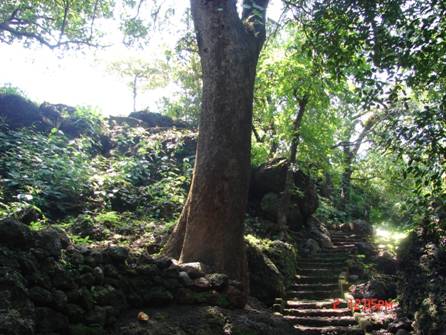Parineeta Dandekar
Inviting endorsements on a submission to the WGEEP for declaring the rivers in the Western Ghats as Ecologically Sensitive Areas (ESAs)
Posted on 22 Apr, 2011 12:58 PMDear friends,
We are all aware of the immense ecological, cultural and social significance of rivers originating and flowing through the Western Ghats. This includes source regions of East flowing rivers like Krishna, Godavari and Cauvery and the source, riparian and estuarine region of all West flowing rivers.
We are lucky to still have some of the very few and very rare 'free flowing rivers' in the country. Most of the rivers in our country have been dammed and diverted. This has changed the ecological and physical characteristics of these rivers completely. Today, it is difficult for us to visualise the amazing range of ecological goods and services that an undammed, free flowing river can provide. Some such rivers in the Western Ghats are Shastri, Aghanashini, Gargai and Seetha Nadi.
A compilation of original articles on rivers, dams and water management initiatives,
Posted on 06 Apr, 2011 04:57 PMRiver schools can make the future look bright - Parineeta Dandekar
Posted on 04 Mar, 2011 01:25 PM Above - Children studying a map of the Chalakudy Basin. Photo - RRC.
Above - Children studying a map of the Chalakudy Basin. Photo - RRC.
Seeds of sustainability and sensitivity when sown at a young age, blossom into responsible individuals. And you need to be in touch with the land to sow those seeds. The Central and State Boards of Education in India have made Environmental Science a compulsory subject for schools and junior colleges (for all subjects). But Environmental Sciences is not to be studied in the classroom. In order to understand the erosion and deposition processes of a river, students need to visit a river bend in their city and in order to instil a lifelong aversion to plastic bags, a landfill and dumping grounds need to be seen.
Temple fish sanctuaries: Last bastions of native fish and pristine river stretches - A report
Posted on 01 Mar, 2011 12:56 PM
Temple Fish Sanctuaries: Last bastions of native fish and pristine river stretches
Wetlands (Conservation and Management) Rules 2010 - Welcome, but a lost opportunity - Press release by SANDRP
Posted on 04 Feb, 2011 10:33 AMOn the occasion of the World Wetlands Day 2011, while we welcome the notification of Wetland (Conservation and Management) rules 2010 by the Union Ministry of Env
Questions on the ‘Value’ of a river for Indians - A review of the book "Economics of River Flows" by Dr. Bharat Jhunjhunwala
Posted on 01 Feb, 2011 05:38 PMIn his last book, 'Economics of hydropower' Dr. jhunjhunwala comes to a conclusion that we have neglected some very important costs of hydropower, while overestimating its benefit.
We are not doing a true cost-benefit analysis of hydropower dams in India - Interview with Dr. Bharat Jhunjhunwala
Posted on 28 Jan, 2011 05:46 PM Dr. Bharat Jhunjhunwala, past faculty at IIM, Bangalore, holds a doctorate in Economics. He has been working persistently on economic impacts of hydropower dams, applying the concepts of environmental economics to arrive at some interesting results.
Dr. Bharat Jhunjhunwala, past faculty at IIM, Bangalore, holds a doctorate in Economics. He has been working persistently on economic impacts of hydropower dams, applying the concepts of environmental economics to arrive at some interesting results.
His latest book, ‘Economics of River Flows: Lessons from Dam Removals from America’ analyses dam decommissioning examples from the United States and raises some pertinent questions about costs benefit analysis of dams in India. His earlier book, ‘Economics of Hydropower’ raised questions about economic efficiency, viability and sustainability of Hydropower Dams in India.
Parineeta Dandekar, IWP, talks with him on some of these issues.
Dr. Bharat Jhunjhunwala can be contacted at: bharatjj@gmail.com
Sustainable water management initiatives in Konkan under threat - A report
Posted on 21 Jan, 2011 02:09 PMGuest Post by: Parineeta Dandekar
At the first sight, Daarche Paani (‘water at the doors’) appears unreal.. on a small flat plateau called ‘Sadaa’ in konkan, an elegant cobbled walkway leads a puzzled visitor to stairs carved in stone, which go down to an ancient grove, and here is an intricate system of tanks, channels and falls which supplies water to the Panderi village and goes down as a free flowing stream, to irrigate a plantation of arecanut, pepper and mangoes in a village called Gudaghe. When I visited the place, I could see three eminent visitors, a silent lady washing her load of clothes, a fairy bluebird splashing at a tank and a huge moonmoth in one of the trees.
 Stone walkway and ancient mango trees leading to Daarche Paani.
Stone walkway and ancient mango trees leading to Daarche Paani.
Photo: Parineeta Dandekar
"Indian rivers have not been understood as ecosystems but are treated as conduits of water or wastewater" - Interview with Dr. Brij Gopal
Posted on 17 Nov, 2010 04:42 PMDr. Brij Gopal, Vice President, National Institute of Ecology and former Member, Working Group on Minimum Flows, constituted by the Water Quality Assessment Authority, talks to Parineeta Dandekar, India Water Portal about the urgent need of freshwater flows in Indian rivers, and the legal and institutional set ups required to ensure this.
Urban local initiatives and government responses: A case of Dev Nadi in Pune
Posted on 21 Oct, 2010 01:26 PMMost of the rivers and streams in urban India are dead. With a very few and rare exceptions, these once-beautiful water bodies have been encroached upon, sources dried up or converted into sewage drains all over the country.Water is being sourced or pumped from sites upstream of the city for its needs or from long distances and the city administration has little incentive for cleaning its own muck. The dismal figures of urban sewage treated by sewage treatment plants, their installed capacity and efficiency stand testimony to this.